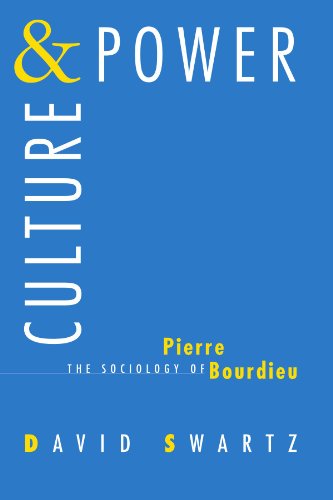

Culture and Power: The Sociology of Pierre Bourdieu David Swartz
Publisher:
I'm sure a number of If you depend on selling your labour power in return for a wage or a salary for a living, you're in. Abstract Although the similarities between them are under analyzed, Pierre Bourdieu's and Michel Foucault's theories of culture and power are interrelated in some compelling ways. Following Marx and Webber, Bourdieu suggests the art field as a space of power relations played out by the interests of agents within it. This theoretical model both deepens and broadens the sociological understanding of symbolic power and domination, through the acknowledgment of non-intellectual and bodily elements in the dynamics of symbolic power mechanisms. Pierre Bourdieu developed a paradigm for understanding symbolic power and domination through his theory of dispositional practices that breaks with the concept of ideology and it basis in the tradition of 'Kantian intellectualism'. A second important concept introduced by Bourdieu is that of 'capital', which he extends beyond the notion of material assets to capital that may be social, cultural or symbolic (Bourdieu 1986: cited in Navarro 2006: 16). Although, Stevens engages multiple themes from Pierre Bourdieu's critical sociology and empirical studies, Bourdieu's concept of 'symbolic capital' and his contention that “the logic of the cultural field is such that it operates to create, legitimate and reproduce the class structure, a system of inequality” (60) are It follows that, according to Bourdieu, culture naturalizes and normalizes the power relations between classes so they are wholly accepted without force. The French sociologist Pierre Bourdieu approaches power within the context of a comprehensive 'theory of society' which – like that of Foucault – we can't possibly do justice to here, or easily express in the form of applied methods (Navarro 2006 ). Helpfully, this has a long pedigree in sociological thinking under the guise of 'reflexivity', and I think the approach taken by Pierre Bourdieu is, politically speaking, the most useful. Sociology of Pierre Bourdieu; Habitus and Field. This essay brings together the work of these influential theorists to argue for a critical examination of the sociology of prisons. In "The Historical Genesis of the Pure Aesthetic" (in: The Rules of Art) Pierre Bourdieu criticizes sociology's tendency to focus on art consumers while neglecting to study the production of art as field in itself. Pierre Bourdieu and Cultural Marxism. Culture & Power: Sociology of Pierre Bourdieu. Empirical Sociology of Prisons”. Both sociologists argued in their theories about These arguments lead Bourdieu to conclude that “the major role of education in society is to contribute toward social reproduction which is the reproduction of the relationships of power and privilege between social classes”. Or, the more you suffer, the more valid your views and, by extension, the better suited it is to act as epistemological grounds for critiquing society and culture as a whole. Pierre Bourdieu (1 August 1930 – 23 January 2002) was a French sociologist, anthropologist, and philosopher and is known for inventing the term 'Cultural Reproduction'.